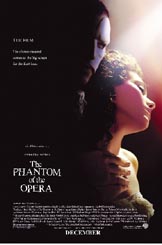  |
  |


Nominated for 3 Academy Awards and 3 Golden Globes, including Best Motion Picture - Musical or Comedy, The Phantom Of The Opera is one of the most talked about movies of 2004. Taking the smash commercial success of Andrew Lloyd Webber's stage production to the big screen is no easy task, but long-time Hollywood director Joel Schumacher is more than able to get the job done. He takes an otherwise poorly written screenplay (minus the awe of a live performance no less) and manages to thrill the audience with the visual aspects of a film chiefly intended to rehash a successful stage musical. The costumes and set are simply magnificent, and Art Director John Fenner (Raiders Of The Lost Ark) helps Schumacher put together a fabulous production that's well worth a movie-goer's time.
The Phantom Of The Opera centers around a mysterious character who dwells underneath the Paris Opera House, imbibing himself on the music that emanates from above. Known as The Phantom (Gerard Butler), he wears a half-mask to cover the hideous facial scars that have plagued him since birth. A musical genius, the phantom is infatuated with the opera, and when he falls in love with the voice of a young chorus girl named Christine (Emmy Rossum - The Day After Tomorrow (2004), Mystic River (2003)), this love of the opera morphs into an outright obsession. The phantom provides Christine with one-on-one voice lessons, while during his spare time, he terrorizes the opera house in an effort to land his protégé the opera's leading role. When Christine finally rises to that position, however, she is reunited with childhood friend Raul (Patrick Wilson), and the two begin a torrid love affair. Vengeful and jealous, the phantom kidnaps Christine and holds her prisoner in his underground lair, and Raul is the only one who can save her.
Onscreen, The Phantom Of The Opera is weak by the standards of a traditional film. The cast does its best to make the most of a screenplay peppered with rigid dialogue - a script designed to sell "the music of the night". The supposed magnetism between Christine and Raul is non-existent and not really believable. As such, the audience is forced into believing that the phantom (who, by contrast, is quite charismatic in this rendition) would end up playing second fiddle to a man who makes Al Gore seem animated. Overall, however, other aspects of the film make up for this flaw.
Based on Gaston Leroux's 1925 novel of the same name, The Phantom Of The Opera loses much of its original edge given the phantom's transformation from a frightening and mangled lunatic to a watered down half-scarred/half-babe-magnet figure complete with likeable characteristics. But inevitably, that's the mark of an enduring franchise - its malleability in the realm of numerous genres and the public's willingness to embrace such changes. But arguably, the small changes in the original novel's plot were necessary to achieve Lloyd Webber's goal of a melodramatic and stirring Broadway musical boasting mass commercial appeal. In a year in which the Oscar nominations were mostly dominated by lower-budget, surprise hit films (such as Sideways, Million Dollar Baby, and Finding Neverland), The Phantom Of The Opera holds its own in many aspects (given its pre-production designation as a commercial success). But those who have not seen the stage version are unlikely to be won over to the ranks of the franchise's numerous fanatics. My advice is to definitely see the film if you've ever seen the stage performance or listened regularly to the soundtrack - otherwise, you might be disappointed. After all, no matter how good The Phantom Of The Opera translates to the big screen, there's a reason musicals are not the dominate genre in Hollywood.
| © RIYAN Productions |